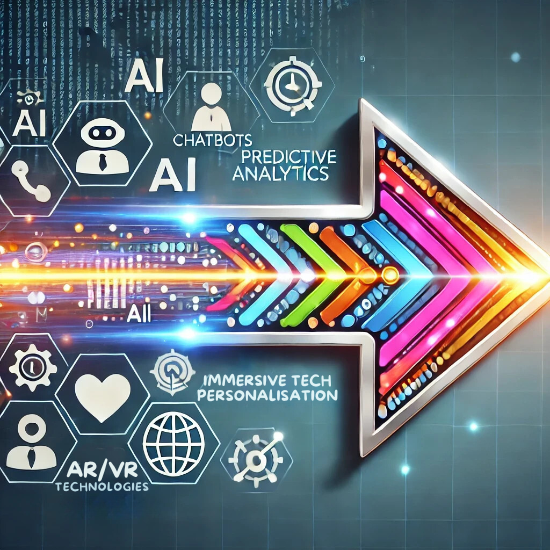MarTech Trends Redefining B2B Marketing Strategies
The world of B2B marketing is undergoing a seismic shift driven by the rapid evolution of marketing technology (MarTech), a term encompassing all the tools and technologies that marketers use to plan, execute, and measure their marketing campaigns. Once considered a supplementary tool, MarTech has become a cornerstone in businesses seeking a competitive edge. From AI-driven personalisation to real-time data integration, these advancements are not just enhancing campaigns but fundamentally transforming how businesses engage with their audiences. As we look towards the future of B2B marketing, it’s clear that keeping up with MarTech trends is essential in today’s increasingly digital landscape.
This article explores the key B2B marketing trends shaping this future, diving into technologies and strategies that redefine customer relationships, enable hyper-personalisation, and drive efficiency at scale. By understanding these trends, businesses can position themselves to leverage innovation effectively, ensuring they remain at the forefront of their industries. Whether you’re navigating the complexities of data privacy, scaling account-based marketing efforts, or integrating immersive experiences, this guide will provide insights into how MarTech is setting the stage for what’s next in B2B marketing.
AI and Automation: Transforming B2B Marketing with Personalisation
Artificial intelligence (AI) is undeniably at the forefront of MarTech trends, revolutionising how businesses approach the buyer journey in B2B marketing. Its transformative power lies in its ability to deliver unprecedented levels of personalisation. By leveraging predictive analytics, businesses can anticipate customer needs, identify behavioural patterns, and craft tailored solutions that resonate deeply with their audience. Chatbots, another AI innovation, provide instant, round-the-clock support, ensuring that no enquiry goes unanswered, while generative AI is redefining content creation by enabling marketers to produce customised messaging at scale. These tools are not just enhancing efficiency; they are also paving the way for highly relevant and engaging customer experiences.
However, as we embrace the future of B2B marketing, a critical challenge arises: balancing the convenience of automation with the human touch essential for trust. While AI excels at processing data and executing tasks, it lacks the emotional intelligence needed to foster genuine connections. Businesses can maintain authenticity by using AI strategically—enhancing, not replacing, human interaction. Personal follow-ups, empathetic messaging, and meaningful client relationships remain crucial in ensuring that automation serves as a bridge rather than a barrier. By striking this balance, companies can harness the potential of AI while staying aligned with the evolving expectations of B2B buyers. Our article “The Role of Personalisation in B2B Marketing: Redefining B2B Marketing for Lasting Success” dives into further detail for those looking to personalise marketing campaigns.
Breaking Down Data Silos with Unified Customer Profiles
In the ever-evolving landscape of MarTech trends, data integration is a critical focus for shaping the future of B2B marketing. Many organisations must grapple with fragmented data spread across disparate platforms, creating barriers to delivering cohesive and personalised experiences. This is where Customer Data Platforms (CDPs) are revolutionising the game. CDPs empower businesses to gain a holistic view of their audience by consolidating data from multiple sources into unified customer profiles. This integration enables real-time decision-making, allowing marketers to respond dynamically to customer behaviours and preferences.
Unified customer profiles also enhance the effectiveness of campaigns by ensuring that every touchpoint delivers relevant and consistent messaging. In an age where precision and personalisation are paramount, data-driven decisions are not just beneficial—they are a competitive necessity. Companies that harness the full potential of their data can identify trends, optimise strategies, and anticipate customer needs more effectively than their peers. By investing in robust data integration capabilities, B2B marketers can position themselves to stay ahead of the curve, ensuring their strategies align with the most impactful B2B marketing trends.
Scaling Account-Based Marketing with MarTech
Account-based marketing (ABM) has long been a cornerstone of effective B2B marketing strategies, and with the rise of MarTech trends, scaling ABM has become more efficient and impactful than ever. Traditionally, ABM focused on targeting a select group of high-value accounts with bespoke strategies. Now, thanks to innovations in marketing technology, businesses can implement hyper-targeted campaigns at scale without sacrificing personalisation. Programmatic ads deliver tailored messages across multiple channels for consistent and relevant engagement. Meanwhile, dynamic content allows businesses to adapt their messaging in real-time based on each account’s specific needs and behaviours.
MarTech’s ability to streamline and amplify ABM efforts is a game-changer, but success requires more than just technology. A deep understanding of personalisation remains critical. For further insights into creating compelling, scalable ABM strategies, you can refer to our article “What is Account-Based Marketing? A Guide to B2B Success”. By integrating cutting-edge tools with thoughtful strategy, businesses can transform ABM into a powerful driver of growth, cementing its place in the future of B2B marketing.
The Rise of No-Code and Low-Code Solutions
Among the most exciting MarTech trends shaping the future of B2B marketing is the rise of no-code and low-code solutions. These platforms are democratising access to advanced technologies, allowing smaller teams and non-technical marketers to create, test, and launch sophisticated campaigns without the need for extensive coding expertise. From building automated workflows to designing personalised landing pages, no-code tools empower businesses to move faster and adapt more effectively to market demands.
One of the most significant advantages of these solutions is their ability to boost agility and efficiency. Marketing teams can experiment with innovative ideas, make real-time changes, and reduce reliance on costly developer resources. This level of flexibility enables smaller firms to compete with larger enterprises by deploying impactful campaigns with a fraction of the budget and time.
By levelling the playing field, no-code and low-code tools are reshaping B2B marketing trends, offering businesses of all sizes the opportunity to innovate and thrive in an increasingly competitive landscape.
Consent Management Platforms: Key to B2B Privacy Compliance
In an era where data privacy has become a cornerstone of consumer trust, privacy-first marketing is emerging as one of the most critical MarTech trends influencing the future of B2B marketing. With evolving regulations such as GDPR in Europe and CCPA in California setting strict data collection and usage guidelines, businesses must navigate a complex landscape to ensure compliance. Failure to do so can result in hefty fines and damage to brand reputation—something no business can afford in today’s competitive market.
Beyond GDPR and CCPA, emerging privacy regulations such as Brazil’s LGPD and India’s DPDP underscore the growing global emphasis on data protection. Consent management platforms have become essential tools in this privacy-first approach. These platforms help businesses adhere to legal requirements while reinforcing ethical data practices by providing transparent mechanisms for obtaining and managing user consent. Beyond compliance, prioritising data privacy builds trust with clients and prospects, positioning companies as responsible and customer-centric.
This focus on privacy is more than just a legal obligation; it’s a strategic advantage. B2B marketing trends show that businesses embracing privacy-first practices are better equipped to foster long-term relationships and stand out in a market where trust is increasingly valued. By aligning with these principles, organisations can secure their place in the future of B2B marketing.
Immersive B2B Marketing: Exploring AR, VR, and Gamification
Interactive and immersive marketing technologies are rapidly redefining the possibilities within B2B marketing, making them a key focus among MarTech trends shaping the industry’s future. Virtual and augmented reality (VR and AR) are at the forefront of this shift, enabling businesses to create experiences that engage and captivate their audiences in entirely new ways. Virtual product demonstrations, for example, allow potential clients to explore complex solutions in a hands-on, simulated environment, providing a level of clarity and engagement that traditional formats struggle to match. Similarly, immersive trade show experiences powered by AR can transform how businesses showcase their offerings, blending innovation with practicality.
Beyond these applications, gamification is also proving to be a powerful tool for boosting engagement. By integrating interactive elements such as quizzes, simulations, or challenges, businesses can make their marketing efforts more memorable and effective. For further insights into how these technologies are evolving, refer to our article “What is Web3 Marketing? A Guide to Navigating the Future of Digital Marketing”. As these immersive technologies continue to develop, they are poised to become a cornerstone of B2B marketing trends, offering businesses new ways to connect, educate, and inspire their audiences.
Using Predictive Analytics for Real-Time B2B Marketing Decisions
Predictive analytics and real-time insights are transforming how businesses approach B2B marketing, solidifying their place among the most influential MarTech trends today. These tools (like Salesforce Einstein or Adobe Analytics) empower marketers to harness real-time data, enabling them to adjust strategies dynamically and stay ahead in fast-paced environments. For instance, real-time audience segmentation allows businesses to tailor campaigns on the fly, ensuring that messaging resonates with the right audience at the right moment. Similarly, predictive analytics helps optimise live campaigns by forecasting outcomes, identifying opportunities, and mitigating risks before they arise.
This level of agility is becoming essential in the future of B2B marketing, where responsiveness can make or break a campaign. By reacting swiftly to shifts in audience behaviour or market conditions, businesses can maximise impact while minimising wasted effort and resources. As competition intensifies, the ability to adapt in real-time isn’t just a tactical advantage—it’s a necessity. By embedding predictive analytics into their marketing frameworks, companies can position themselves as forward-thinking and customer-centric, aligning with the evolving expectations that define today’s B2B marketing trends.
Conclusion: Leveraging MarTech Trends for B2B Success
The MarTech trends shaping the future of B2B marketing are revolutionising how businesses connect with their audiences, drive engagement, and achieve their goals. These innovations, from AI-driven personalisation and data integration to immersive technologies and real-time analytics, empower companies to be more agile, efficient, and customer-centric. As the landscape continues to evolve, staying ahead of these B2B marketing trends is no longer a luxury—it’s a necessity for businesses aiming to maintain a competitive edge.
At Alpha P Tech, we specialise in helping businesses navigate this transformative era by crafting tailored strategies that harness the power of cutting-edge marketing technology. Whether you’re looking to optimise your campaigns, integrate new tools, or develop a future-focused B2B strategy, we’re here to help. Visit our services page to learn more about how we can support your journey towards marketing excellence. Let’s shape the future of B2B marketing together.



